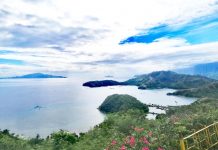by Melissa Peñaflor and Maya Vandenbroeck
A BUS RIDE along the General Santos-Davao highway shows on one side of the road the grand spread of mountains and hills, their jagged folds and edges softened by tall grass. On the other side, as a contrast to the rugged natural view, the symmetry of rows upon rows of mango trees made possible by human architecture. The road thus seems to serve as a marker to separate scenery from cultivation. But occasionally this line blurs here in Malungon, devoid of white sand and blue waters; the only land-locked municipality of Sarangani Province.
Take the case of the 17-hectare mango farm in Sitio Pulatana, Barangay Malandag whose owner, Benjamin Figueroa, has gone beyond just farming and selling mangoes. Banking on the property’s rustic scenery and the view it affords of nearby Mt. Apo and Sarangani bay, Mr. Ben has made a multi-income earner out of his mango farm by turning it into an agro-tourism resort.
Located about 40 kilometers from General Santos City, the Diamond Head Mountain Resort offers a convenient escape from urban life. A blue “Helipad” signpost by the roadside marks the entrance to the resort and a short drive through a dirt road eventually leads to a six-tiered building, the shape of a modern-day pagoda. The 100-seater convention hall on the ground floor is already operational and available for reservations; the restaurant on the second floor will follow later. The third floor is where Mr. Ben lives; the fourth floor will house the guest rooms.
The sight of this towering concrete structure in the midst of mangoes, coconuts and shrubbery might come off as surprising, if not a bit out of place. However, you’ll discover that the building isn’t the only “stunner” the resort offers. City-dwellers will find this resort a dreamlike escape from the dust, noise, and gray of urban living.
The rolling hills carpeted with soft grass and shrubbery and the botanical garden of Philippine ornamental plant varieties like bougainvillea, euphorbia, san francisco, and chitchirita make an ideal meditation paradise. But Mr. Ben has bigger plans in mind. He envisions his resort as a venue for seminars and conferences where the agricultural sector, the private sector, and the government sector share market information and discuss the latest in farming developments.
Guests can walk down narrow concrete pathways that wind throughout the resort from one hill to another. One trail spirals around a cone-shaped hill and leads to an eight-sided bamboo hut at the top, which offers a 360-degree view of the area. The hut’s rounded appearance is where Mr. Ben got the idea for the resort’s name: Diamond Head.
From the hut, one can spot signboards containing words of farming wisdom, which are mounted on one side of one of the resort’s wooden halls. “The best fertilizers are the footprints of the owner in his farm,” reads one. This Mr. Ben apparently takes to heart, since he actually does go about the resort with bare feet.
Agro-tourism for him essentially means serving his guests only food that comes from his farm such as mangoes, bananas, rambutan, chico, pomelo, coconut, durian, and lanzones. There is also an animal farm, which supplies the resort with pork and poultry, and the house’s specialty: pato-tin, a roast duck dish. This indigenous people’s recipe and ingredients are so top-secret that no one knows how it is prepared, only the trusty cook knows.
The resort’s two other permanent employees are the head carpenter and the gardener. For the rest, indigenous people from adjacent communities are employed to help with catering services during conferences as well as construction work and carpentry work. Even the neighbors have been mobilized to grow in their backyards vegetables, which the resort buys.
In the meantime, gradual work on overnight cottages has begun. For the native-themed cottages, dried coconut fronds, wood, and bamboo growing in the area are used—Mr. Ben’s way of advocating “zero waste.” He is projecting to build 50 cottages which can accommodate overnight guests. The current lack of an overnight facility, however, does not seem to deter some guests from spending the night outdoors.
I, too, wish to stay longer and lie beneath the mango trees and gaze at the Big Dipper. In this serene getaway it is not hard to imagine God peering through the star-holes in the night sky to watch the busy earthlings wrapped up in their various emergencies at work, in school, and at home. Down there, everything’s close-up, so problems like lovers’ quarrels or a stolen cellphone or a failing grade seem to be graver than they really are. But here, far away from all the noise and urgency, amidst the fruit trees and flowers, it’s like the world’s troubles have melted into one, and mine’s just a vague dot in the blob.
Come to think of it, reality checks in life there are a lot. In the end, we sometimes need to be alone surrounded by just the rustle of plants growing and moving every so undetectably. Sensing with all our might the plants talking to us, imploring us to smell their beauty. I can hear them whispering to me that they have feelings too, that we self-obsessed humans should live more humbly with them, taking from the Earth only enough, never more than we can eat or need.


